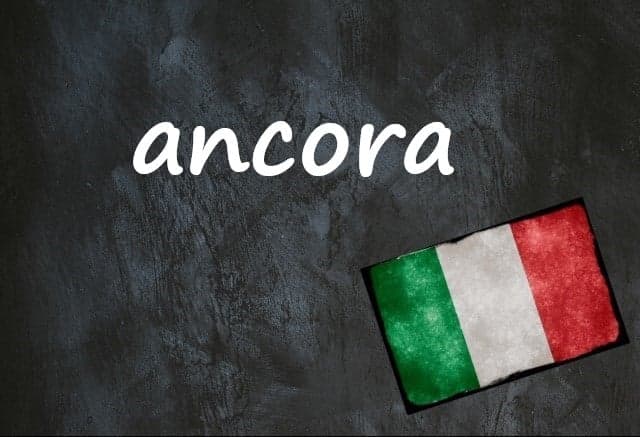
Italian word of the day: 'Ancora'

Haven't picked up this Italian word yet? It's one you'll need again and again.
If you ever plan to talk about time, occurrence, recurrence or quantity in Italian, ancora is a word you need to know. It unites several fundamental concepts, all in one simple little term.
Let's start with what's thought to be ancora's original meaning: 'until now', or as we're more likely to put it, 'still'.
Silvia è ancora in ufficio.
Silvia is still at the office.
Sei ancora innamorato di lui?
Are you still in love with him?
That's when you're saying that something is still going on. But here's where Italian is actually easier than English: if we want to say that something still isn't happening, we usually switch to 'yet'. In Italian, you just keep on using ancora.
La lettera non è ancora arrivata.
The letter hasn't arrived yet.
– Siete pronti, ragazzi?
– Non ancora!
– Are you ready, guys?
– Not yet!
Now for a different sense: ancora also means 'again'.
Provaci ancora.
Try it again.
Sono venuto ancora a cercarti, ma tu non c'eri.
I came looking for you again, but you weren't there.
Grazie ancora!
Thanks again!
From there it's not so big a leap to another of ancora's meanings: 'more' or 'another'. Think of it as a sign that you're getting second helpings, whether that's an action recurring or a thing you're receiving more of.
Prendi ancora un biscotto.
Have another biscuit.
– Vuoi ancora zucchero?
– Grazie, ancora un po'.
– Would you like some more sugar?
– Thanks, just a little more.
Aspettiamo ancora una mezz'ora.
Let's wait another half an hour.
With us so far? There's just one more main meaning you need to know about: ancora can also be 'even (more/less)', when you're making some kind of comparison or talking about a change in quantity or intensity.
Sei diventato ancora più bello.
You've become even more handsome.
Oggi fa ancora più freddo.
It's even colder today.
Questo film è ancora peggio di quello precedente.
This film is even worse than the one before.
We'll leave you with a homonym that's not nearly so useful, but mildly interesting nonetheless: don't confuse ancora (adverb) with un'ancora (noun), which is an anchor, or with un'ancora di salvezza (literally, 'safety anchor' – the one you use after everything else has failed), which is a metaphor for a lifeline or last hope.
Do you have a favourite Italian word or expression you'd like us to feature? If so, please email us with your suggestion.
Comments
See Also
If you ever plan to talk about time, occurrence, recurrence or quantity in Italian, ancora is a word you need to know. It unites several fundamental concepts, all in one simple little term.
Let's start with what's thought to be ancora's original meaning: 'until now', or as we're more likely to put it, 'still'.
Silvia è ancora in ufficio.
Silvia is still at the office.
Sei ancora innamorato di lui?
Are you still in love with him?
That's when you're saying that something is still going on. But here's where Italian is actually easier than English: if we want to say that something still isn't happening, we usually switch to 'yet'. In Italian, you just keep on using ancora.
La lettera non è ancora arrivata.
The letter hasn't arrived yet.
– Siete pronti, ragazzi?
– Non ancora!
– Are you ready, guys?
– Not yet!
Now for a different sense: ancora also means 'again'.
Provaci ancora.
Try it again.
Sono venuto ancora a cercarti, ma tu non c'eri.
I came looking for you again, but you weren't there.
Grazie ancora!
Thanks again!
From there it's not so big a leap to another of ancora's meanings: 'more' or 'another'. Think of it as a sign that you're getting second helpings, whether that's an action recurring or a thing you're receiving more of.
Prendi ancora un biscotto.
Have another biscuit.
– Vuoi ancora zucchero?
– Grazie, ancora un po'.
– Would you like some more sugar?
– Thanks, just a little more.
Aspettiamo ancora una mezz'ora.
Let's wait another half an hour.
With us so far? There's just one more main meaning you need to know about: ancora can also be 'even (more/less)', when you're making some kind of comparison or talking about a change in quantity or intensity.
Sei diventato ancora più bello.
You've become even more handsome.
Oggi fa ancora più freddo.
It's even colder today.
Questo film è ancora peggio di quello precedente.
This film is even worse than the one before.
We'll leave you with a homonym that's not nearly so useful, but mildly interesting nonetheless: don't confuse ancora (adverb) with un'ancora (noun), which is an anchor, or with un'ancora di salvezza (literally, 'safety anchor' – the one you use after everything else has failed), which is a metaphor for a lifeline or last hope.
Do you have a favourite Italian word or expression you'd like us to feature? If so, please email us with your suggestion.
Join the conversation in our comments section below. Share your own views and experience and if you have a question or suggestion for our journalists then email us at [email protected].
Please keep comments civil, constructive and on topic – and make sure to read our terms of use before getting involved.
Please log in here to leave a comment.